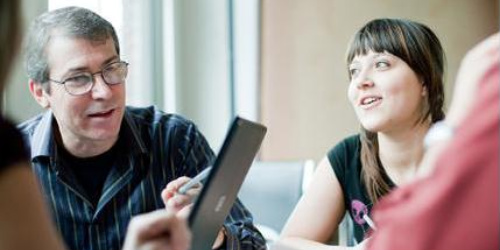
Photo Copyright Kiss My Flash Photography 2011, taken from the Learning Exchange 2010-2011 Annual Update.
This story was originally published in the UBC Learning Exchange UBC-Community Learning Initiative Annual Update 2010-2011. For this and other stories, visit the UBC Learning Exchange site.
While the afternoon Drop-In remains an integral part of the neighbourhood’s digital access, the morning computer sessions supported by HSBC Bank Canada have become livelier and more effective. One significant development is the addition of a SmartBoard, an interactive electronic whiteboard that allows learners to clearly see demonstrations before they practice on their individual computers. More importantly, residents being trained in the Contributing Through Computers initiative now volunteer in the Learning Exchange computer sessions, offering one-to-one support while developing their own skills and confidence.
Volunteers in Contributing Through Computers are also reaching out around the Downtown Eastside to help to reduce the ‘digital divide’, facilitating sessions in six other community organizations last year, with more partnerships in development. By learning how to lead basic computer tutorials, local residents are enabling agencies—such as libraries, housing associations and community non-profit organizations—to more fully utilize public computer labs by providing support to novice users. Since the computer training workshops at the Learning Exchange have been oversubscribed for the past few years, Contributing Through Computers is another way to develop capacity within individuals, and contribute to the broader social sustain-ability of the community.
Increased computer skills activity has also drawn more new people into the afternoon Computer Drop-In. Daily, up to 40 people drop in to discuss current events, conduct job searches, work on school assignments, and access computers to connect with family and friends, and work on creative projects. Notably, diversity in the drop-in is increasing, with more women and ESL learners using the resources available.
Social Sustainability: Contributing through Computers
Ron Sander was one of the first volunteers to be trained as a facilitator in year one of the three-year Contributing Through Computers initiative, which brings community members together to learn to lead computer workshops. The idea behind the initiative is that every-one benefits by building knowledge, skills, and self-confidence, in addition to fostering a heightened sense of belonging and community. “Volunteering is a two-way street. When you help other people, you enrich your own life… you learn from those you teach,” says Ron.
After completing his training, Ron related how excited he was to learn how to share his knowledge with others. “…Over the years, I’ve developed an extensive knowledge base in a number of subjects. Unfortunately, this knowledge, for the most part, is locked in my head…. Volunteering with this program has given me an avenue that allows me to exercise my gifts and knowledge….” In fact, as a result of Ron’s dedication and hard work, he has gone on to secure paid employment with the Union Gospel Mission, an organization that is currently working on setting up a new computer lab in its new building.
The Learning Exchange is pleased to partner with Vancouver Foundation and the Carraresi Foundation on Contributing Through Computers, so that local residents like Ron are able to further contribute to the well-being of the community. As Ron said, “There are incredible opportunities in the Downtown Eastside…for maintaining and sustaining a community where life is worth living.”
Going Beyond Limits Together*
Sue, a retired woman living in seniors housing in Chinatown, says that years of working as a seam-stress—sewing the heavy material of lumberjack shirts—is what caused the mobility problems she has in her hands. Sue initially came to the Learning Exchange to improve her English. Like many seniors in Chinatown, it was during retirement that Sue was able to find time to work on her language skills.
Sue was aware that the Learning Exchange also offered computer sessions, but felt that they were not for her, doubting her ability to manipulate a mouse and keyboard, and concerned that her English would not be good enough to follow technical instruction. Nevertheless, after watching a computer workshop run by the Learning Exchange for women at Tradeworks, a local organization that provides job related skills training, Sue felt ready to try a beginner’s computer workshop.
It turned out to be a good decision. To her delight, Sue found that she could use the standard track-pad on a computer laptop quite easily. She also found unexpected support from John, who was being trained to lead computer skills workshops, at the same time that she signed up to learn computer skills. John, initially shy and sometimes apt to over-explain ideas to groups of learners due to nervousness, transformed when working one-on-one with Sue. He was able to relax and put into practice the concepts discussed in his facilitator training—finding analogies that explained things in a way that resonated with the learner. It helped greatly that John could go over tricky points in Cantonese, too. This relation-ship paved the way for Sue to register for an advanced computer workshop without a second thought, and provided the confidence John needed to realize his strength of helping people one-on-one as he continues to facilitate computer learning.
*Participant names have been changed, and are not pictured.
